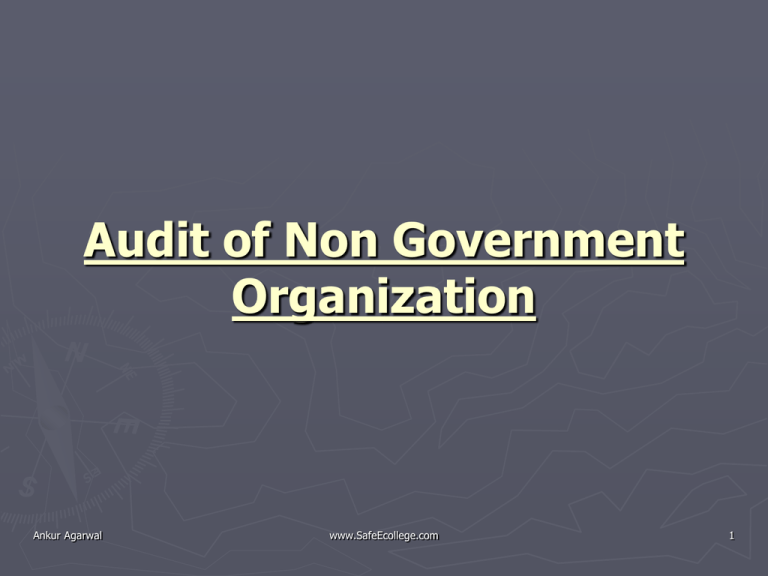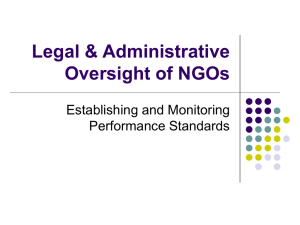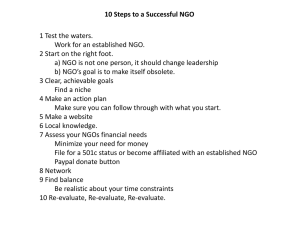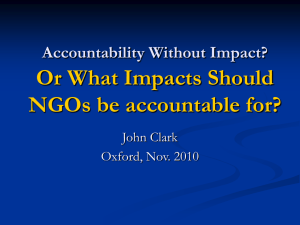audit-of-ngo
advertisement

Audit of Non Government Organization Ankur Agarwal www.SafeEcollege.com 1 ► Meaning The term NGO can be defined as NPO which rages funds from its donors, contributors & members apart from receiving donation of time, energy & skills for achieving their social objectives like imparting education providing medical facility, economic assistance to poor, managing disaster & emergent situation etc..... The definition of NGO is quite wide & includes charitable institutions, religious institutions, research foundation, old age homes, hospital, voluntary health & welfare agencies etc..... ► Examples of NGO’s CRY, NORAD, UNECEF, GODHULI, VIDYA, Concern India Foundation etc..... ► Registration/incorporation The NGO’s can be incorporated as:• Society, under society registration act, 1860 OR • Trust, under Indian trust act, 1882 OR • Section 25 company, under companies act, 1956 OR • Any corresponding law for the time being in force Ankur Agarwal www.SafeEcollege.com 2 Generally NGO is not required to get itself registered, however where NGO is a trust & trust relates to immovable property worth more than Rs. 100 than considering section 17(1), of Registration Act 1908 read with section 123 of transfer of property act 1882, registration becomes mandatory. ► Maintenance of books of accounts If NGO is registered as trust or society, books of accounts shall be maintained ether on accrual or cash basis. However where NGO is incorporated as company, books of accounts shall be maintained on accrual basis. ► Sources & Application of Funds Sources are fund raising programs, advertisement, donation, gift, fee from technical services rendered, sale of publication or produce. Ankur Agarwal www.SafeEcollege.com 3 Generally there are 2 types of contribution: Corpus contribution:• When contribution is made towards capital of NGO it is known as corpus contribution. • Donors generally specify whether contribution made by him shall form part of the corpus of NGO. • Such corpus contribution is not considered when compute total income of NGO for income tax purpose. Revolving fund:• The purpose of revolving fund is to give temporary loan to other NGO’s for their projects & programs & recover the same so as to give temporary loans again & so on. • Interest income on temporary loans may be credited ether to income expenditure account or in fund account. Ankur Agarwal www.SafeEcollege.com 4 ► Provisions Relating to Audit If NGO is registered as trust or society, than auditor is appointed by management of such society or trust. However where NGO is registered under section 23 of companies act than auditor shall be appointed by member of NGO’s. Some statuettes such as FCRA, IT, Companies Act require NGO’s to get their accounts audited & submit their report to prescribed authorities. FCRA has prescribed the format & requires that same to be furnished to ministry of home affairs within 60 days from the close of financial year. Question:- You have been appointed as auditor of an NGO. What matters you will consider when planning the audit of NGO? Answer:- when planning the audit of NGO, auditor should concentrate on following aspects: Knowledge of NGO’s work, its mission & vision, areas of operation & environment in which it operates. Review the legal form of NGO, its Article of Association, Memorandum of Association, Trust Deed, by Laws etc.... Ankur Agarwal www.SafeEcollege.com 5 Updating the knowledge of various statuettes such as FCRA, IT, Companies Act etc.... Including recent amendments, circulars & judicial decisions. Examine the minutes of MC, GB, Board Meetings. Review previous year auditors report. Study NGO’s organizational chart, financial & administrative manuals, project/program guidelines etc…. The involvement of experts & their work. Reviewing accounting & related ICS. Setting the materiality level. Question:- You have been appointed as an auditor of NGO, frame an audit program covering assets, liabilities, income & expenditure? Answer: Corpus fund:• When contribution is made towards capital of NGO it is called corpus contribution. • Examine corpus fund with reference to letter from donors. Ankur Agarwal www.SafeEcollege.com 6 Ear Marked funds:• In case of ear marked funds check the requirements of donors institutions, boards resolution of NGO’s & rules & regulations of ear marked funds. Project/agency balances:• Vouch disbursements & expenditure with reference to agreements with donors. • Ascertain whether any fund for project has been lapsed on account of non utilization within stipulated period, if so ensure that it has been shown as liability payable. Loan’s:• Examine loan agreement. • Ensure that terms & conditions of loan agreements have been complied with. Fixed assets:• Examine opening balances with reference to fixed asset register, schedule, ledger etc…. Ankur Agarwal www.SafeEcollege.com 7 Verify existing immovable properties with reference to title deeds. • Ensure that every sale & purchase is duly authorised. • Ensure that appropriate depreciation has been charged on all fixed assets. • Where any grant is given in respect of fixed assets verify the same with reference to letters from donors/agreement from donors. Investments:• Carry out physical verification of investment as on the last date of balance sheet & see that investments are in the name on NGO. • Ensure every sale & purchase of investment is duly authorised. • See that investment income is duly accounted for. Cash in hand:• Physically verify cash in hand as on the last date of balance sheet & compare the result of physical verification with the balance sheet in cash book. Stock:• Physically verify stock. • Ankur Agarwal www.SafeEcollege.com 8 Obtain certificate from management regarding quantity & value of stock. Bank balance:• Examine BRS & see whether there exist any old, outstanding an unadjusted entries, if so enquire from the management. Programme & project expenses:• Verify agreement with donor supporting particular programme so as to ascertain terms & conditions of agreements. • In case of programme involving contract, ensure that income tax is deducted, deposited & returns are filed. Establishment expenses:• Verify that PF, ESI, life insurance premium have been deducted, contributed & paid over to proper authorities. • Establishment expenses such as printing & stationary, convenes, travelling expenses etc shall be vouches in an usual manner. • Ankur Agarwal www.SafeEcollege.com 9









